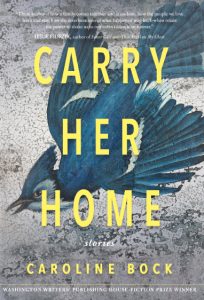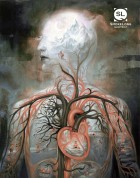Your story is dystopic. What did you set out to achieve with it?
In this story, I started out with the idea that it’s the future, absurdist times, the government is issuing rabbits for food, and a young woman must eat, love, have sex, and hold onto the idea of children, of possibilities.
In the story, we watch as rabbits are gruesomely murdered for meat. But we can’t help but empathize with the narrator and Jim, as they have no other source of food—the government only supplies bunnies. This situation can be likened to modern-day media coverage. People are fed only what the media choose to feed them. As an author based in the U.S., what do you think of modern-day reportage?
We don’t have in the United States, like in other parts of the world, public literary intellectuals. If I were to be one for this fascinating question, I would say we are too often given entertainment, not news. We are given “spin” and left to our own devices to unwind it—too often without the help of an unbiased press. (There is a huge apparatus devoted to spin—I should know; I spent twenty years in public relations.) And we, as media consumers, are unstudied and unquestioning. Even more so, we like pablum; it’s easier than substance and analysis to digest. We are given rabbits and told to survive. We are unhappy, however, and we don’t know why. We blame the government and the media for telling us what we want to hear. Yet we don’t demand more or better. We give up. I don’t want us to give up. So, I write.
I selected your story for many good reasons: great style, clear voice, powerful subtleties. What inspired you to write it?
Two things inspired this story—I heard a segment this spring on the radio, probably NPR, which I listen to way too much when I write, about an idea to pare back the federal government’s Supplemental Nutrition Assistance Program (SNAP) by having people, instead of shop for their own food, receive a set amount of canned goods, or even, raise their own animals, such as rabbits, for food. Both ideas seemed absurdly mean to me, especially the rabbits. As a child, my family had a rabbit as a pet, and this rabbit was a handful to take care of for our family even though my father was raised on a farm and comfortable with animals. So, the two thoughts just collided into this story. I will admit this: our family’s pet rabbit was named Nutmeg or “Nutty,” and we did not eat him. He died of fairly natural causes.
As an author, what draws you to tell stories? What do you like to write about?
I’ve been thinking a lot about the future these days—what the world will be like in fifty or a hundred years, when in all likelihood I will not be here. We will still have love, desire, sex, but what else?
I’m a big fan of “Government-Issued Bunnies.” I’ll like to know what writing project you’re working on next. Should fans like me expect another beautiful dystopic story or something very different?
 I have my debut collection of short stories, Carry Her Home, coming out this October. These 47 very autobiographical stories, ranging from flash to full-length, won the 2018 Fiction Award from the Washington Writers’ Publishing House. I also have a novel-in-progress set in 2099: Remember the Future. It’s about a family separated by government intervention, official lies, and a government-backed fertility experiment. And while the setup is bleak, with a vastly depleted population, worldwide infertility, and a tyrannical United States government, the world is lush in its abundance. I hope this novel does have a future someday soon.
I have my debut collection of short stories, Carry Her Home, coming out this October. These 47 very autobiographical stories, ranging from flash to full-length, won the 2018 Fiction Award from the Washington Writers’ Publishing House. I also have a novel-in-progress set in 2099: Remember the Future. It’s about a family separated by government intervention, official lies, and a government-backed fertility experiment. And while the setup is bleak, with a vastly depleted population, worldwide infertility, and a tyrannical United States government, the world is lush in its abundance. I hope this novel does have a future someday soon.



 The core workshop of SmokeLong Fitness is all in writing, so you can take part from anywhere at anytime. We are excited about creating a supportive, consistent and structured environment for flash writers to work on their craft in a community. We are thrilled and proud to say that our workshop participants have won, placed, or been listed in every major flash competition. Community works.
The core workshop of SmokeLong Fitness is all in writing, so you can take part from anywhere at anytime. We are excited about creating a supportive, consistent and structured environment for flash writers to work on their craft in a community. We are thrilled and proud to say that our workshop participants have won, placed, or been listed in every major flash competition. Community works.